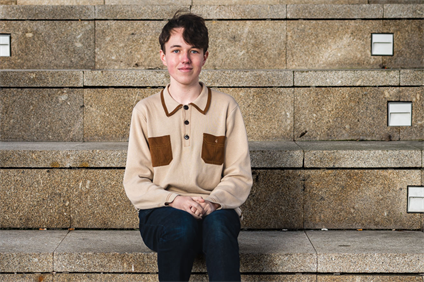Blog: Men's Mental Health Awareness
Hi, I’m Digby, a first-year Digital Media and Communications student at UoB. I’ve experienced difficulties with my mental health and anxiety, especially during such a huge transitional phase like starting in a new environment with lots of new people - which was new to me coming from a small village in the countryside.

Although so many men like me go through similar struggles with their mental health, entrenched stereotypes of ‘weakness’ in asking for help or feeling low leads many to struggle in silence. Mocking human emotions such as crying in media and television further drives men to not talk about their feelings and what they’re struggling with, leading to disheartening statistics about men’s health. Men are 3 times more likely to commit suicide than women in the UK, but only 12.5 percent of men in the UK have a registered mental health disorder, further highlighting the unwillingness to speak out.
To help challenge these harmful societal norms and troubling statistics, Men’s Mental Health Awareness Month aims to bring to light the reality of men’s mental health, encouraging men to seek support and develop healthy coping strategies, such as exercise and mindfulness activities. It is also an opportunity for friends and family of men who may be struggling to educate themselves on ways to support someone when they’re going through a hard time, such as asking non-judgemental questions and expressing your care for them both verbally and physically being there for them in times of need.
Even though, societally, stigma around men’s mental health is slowly shifting away from traditional stereotypes, nearly a third of men still report not knowing where to turn for support. Generational divides are still evident, with younger generations being more willing to talk about mental health than older generations, according to Bupa’s 2025 report. Men’s Mental Health Awareness Month aims to break down those barriers and try to take the pressure off men to normalise conversation and societal change.
Many avenues exist to seek support, yet even I’ve struggled to reach out, believing that what I was going through wasn’t important or that I would be seen as ‘soft’ or ‘weak’. But reaching out is a strength. Whether talking to friends and family or seeking professional help such as therapy or having a conversation with your GP can also be beneficial, especially if your mental health is cause for medical concern and in need of testing and diagnosis.
UoB support:
The University also offers support through multiple branches, with some being specific to support for addiction and problematic porn use. Here is a list of links for these student support sites:
- UBHeard – a 24/7 free helpline for emotional, mental health, financial, legal and medical support.
- Wellbeing Officers – you can contact a Wellbeing Officers in your specific school, and they will assist you.
- Pause – you’re welcome to visit the Wellbeing Lodge during drop-in hours, Monday-Thursday 11:00-17:00 to talk to trained support staff.
- Better Than Well – a student support community for those facing addiction and in recovery.
- Pivotal Recovery – an online, self-guided course for problematic porn use and compulsive sexual behaviour.